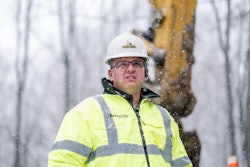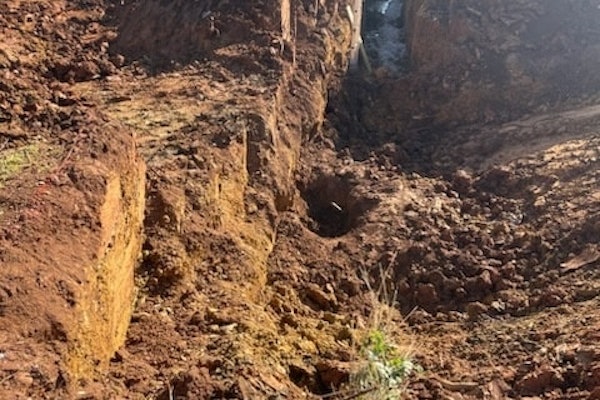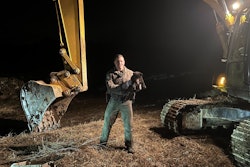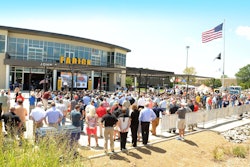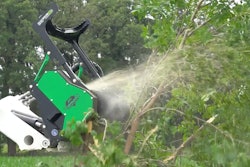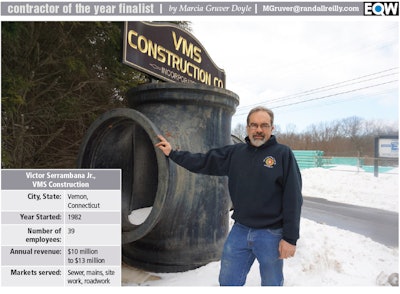
And so does his son.
Serrambana Sr. started his own construction firm after working for several companies as a foreman or superintendent and serving a tour of duty in Vietnam.
“From a young age I was around equipment,” recalls his son. As a teenager, “I was shovel for shovel with the guys. There was no question where I was going to work.”
But college came first. Victor earned a civil engineering degree, and after getting a master’s degree, he became a licensed engineer. All along he was working at VMS in the field during holidays and summer breaks.
When it came time for the company to transition from father to son, Serrambana remembers the conversation he had with his father. “Dad talked for two hours about quality and reputation and not about making money,” he recalls. “Our name is a brand, and ‘VMS’ is a gold stamp on the quality of work done.”
“Dad knew I had paid my dues,” he says. Serrambana assumed the reins of VMS in 2000.
Owner, contractor, engineer
The combination of boots-on field training and being a licensed engineer gives Serrambana an advantage. “You are allowed a certain amount of respect in meetings,” he says. “I have the perspective of being an owner, a contractor and an engineer. I can see their viewpoint, and it goes a long way toward moving things along.” It doesn’t hurt that his master’s thesis was on trust and its cost impact in the construction industry.
You can sense that Serrambana brings a level of meticulousness to his jobs. He tells crews to leave the jobsite every night “like we’re not coming back.”
“One of my goals,” he continues, “is that you don’t get after-hours calls on my jobs.”
Water and sewer work now make up about 80 percent of VMS’s jobs, which includes roadwork. Specializing in deep-trench municipal infrastructure projects, the company has also built pumping stations and reservoir projects.
Serrambana is always looking for efficiencies. For example, each of his crews has a tool van that has everything needed on a jobsite – and in good working order – whether that job involves sewer or water or paving work.
That way his crews are ready to roll for whatever the next job requires, including calls in the middle of the night.
The heavy sewer/water jobs VMS specializes in require production machines, and the company’s fleet primarily includes excavators, compact excavators, wheel loaders and rollers, along with a significant fleet of heavy trucks. “Because of the cost savings, we tend to buy out of a rental fleet because we know a machine has been taken care of,” Serrambana says.
Most VMS crews also go out with two tri-axle dump trucks. “Having a truck on site means we never stop working” as materials are placed or removed, explains Serrambana.
The company has had a six-bay shop for 22 years, and its three-person shop includes a welder. “We try to do as much as we can, but these days, the first thing a mechanic does is grab a laptop to fix a machine. Our dealers are an important part of how we get things done.”
VMS also owns two milling machines and a utility paver. “I paid for those pieces on one job,” he says. “Having a milling machine shaved a tremendous amount of time off the job, and we’re not at the mercy of a sub as to when we can use it.”
High bar for safety
“Years ago, we decided we were going to set a high bar for safety,” Serrambana says. “We’re way past having a discussion about hardhats and vests. If you don’t want to wear them, you don’t work here.”
Worker protection is paramount when working in trenches. “There’s no such thing as ‘we don’t have it,’” Serrambana comments. “We have 37 trench boxes, an array of hydraulic jacks and more steel plates than a contractor 10 times our size. That’s our guy in the hole. The most important guy is the guy connecting the pipe, and you don’t rush them.”
This attention to safety may be partly why turnover is almost nonexistent at VMS. “If someone lasts a couple of weeks, they retire here,” Serrambana says.
He’s always looking for people with work ethic and decent skills. “It has to be the kind of person who wants to be getting things done,” Serrambana says. Although not signatory to a union, VMS pays union scale and benefits. “There’s no financial reason for anyone to leave here. Pay is eliminated from the equation.”
VMS runs a lean organization, a tactic that saw it through the difficulties of the last downturn. This includes running crews that have one to two people fewer than competitors’ crews. “We do the same thing in the office and our repair shop,” Serrambana says.
Personal involvement
Serrambana still adheres to his “shovel for shovel” upbringing. “My personal involvement in the day to day goes a long way,” Serrambana comments. “On a difficult job, they need to see the owner trying to solve a problem with them.”
“They are beyond reproach,” says client Craig Patla with Connecticut Water Service. “We put less-seasoned inspectors out with him, so they can learn how to do it. VMS has raised the bar in our select contractor group.”
Patla continues: “We had a job that was segmented into four phases, and it had a tight 18-month timeline. As the project went on, it became clear the only way to meet our deadlines was if Victor could have all four phases. This project was watched by everyone, including the Connecticut DOT and governor’s office. It was our most visible project, and he knocked it out of the park with plenty of time to spare. It made us look great.”
Patla was so impressed he recommended the project for a 2017 Connecticut Associated Builders and Contractors’ Excellence in Construction Award.
“When they are the low bidder on a job, I am completely relieved,” says Susan Negrelli with the Hartford, Connecticut, Metropolitan District Commission. Adds Jason Waterbury, also with the commission: “Because of his engineering background, he puts himself in the shoes of the owner and asks, ‘What is the best solution?’ A lot of times contractors say, ‘It’s my way or the highway,’ but not Victor.”





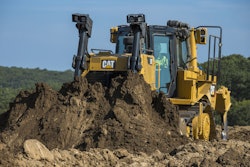
![Solid Earth 1[4546]](https://img.equipmentworld.com/files/base/randallreilly/all/image/2018/03/eqw.Solid-Earth-14546.png?auto=format%2Ccompress&fit=crop&h=167&q=70&w=250)
